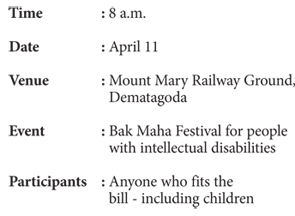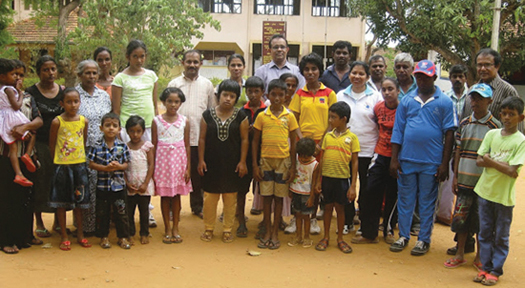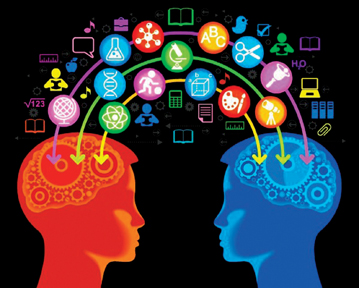Different kind of fun
... as the intellectually challenged enjoy their very
own Avurudu Olimpics :
 It was a fun filled occasion. With the bright sunny skies, flowering
trees and the sound of the koha’s (koel) mating cries filling the air,
it seemed that the Sun God had gone out of His way to shower his
blessings to the very special guests at the Bak Maha Special Olympics
festival, which was being held at the Mount Mary Railway Children’s
playground. It was a fun filled occasion. With the bright sunny skies, flowering
trees and the sound of the koha’s (koel) mating cries filling the air,
it seemed that the Sun God had gone out of His way to shower his
blessings to the very special guests at the Bak Maha Special Olympics
festival, which was being held at the Mount Mary Railway Children’s
playground.
At the entrance of the playground, now transformed into a veritable
carnival of colours decked out with flags, banners and tents, stood the
organisers - Special Olympics Sri Lanka (SOS) who welcomed the 600
participants, most of whom were children, all of them with intellectual
disabilities.
Hailing from districts scattered across the country, from Colombo to
Galle, Hambantota, Ambalangoda, Anuradhapura, Polonnaruwa and Kandy
among others, they belonged to the local branches of the SOS and the
tents that dotted the playground were each stamped with their unique
culture. Ambalangoda showcased its proud heritage of masks, while the
Jaffna tent was decorated with palmyrah palms and banana leaves, its
floor decorated with colourful kolam designs...
The children even wore clothes that identified them with their
district - sarongs, sarees, lama sarees, to name a few.
 Watching them taking part in the bun eating competition, the aliyata
es thebeema (marking the eye on the elephant), the sack race, fancy
dress parade, the organisers shared their joy and achievements and
rewarded their efforts with gifts. Watching them taking part in the bun eating competition, the aliyata
es thebeema (marking the eye on the elephant), the sack race, fancy
dress parade, the organisers shared their joy and achievements and
rewarded their efforts with gifts.
As Chairman of Special Olympics Serendib (SOS - Sri Lanka) Dr Nimal
Kariyawasam observed, “We have researched evidence that those with
intellectually disabilities often excel in sports activities - and this
is no exception”.
Noting that Sri Lanka had over 650,000 persons with intellectual
disabilities, he said participation in sporting activities went beyond a
mere physical exercise in the case of such persons. “Sports is a
therapy, which gives significant improvement to mental strength, which
is not gained through long term education in classrooms. This has been
proved by international studies. Our aim is thus to empower individuals
with intellectual disabilities to be physically fit, productive and
respected members of society through sports.”
Evidence
It is this message that SOS Sri Lanka which was founded in 2004 and
re-organised in 2012, is carrying to all its branches spread throughout
the island - from Colombo, to the deep south in once neglected villages
as Hambantota, Matara, Galle, Ambalangoda to the North Central Provinces
at Anuradhapura and Polonnaruwa to Jaffna and the central hills of Kandy,
where both adults and children with intellectually low capacities are
provided year-round sports training so that they may excel in a variety
of Olympics types sports.
What is more, the organisers have a clutch of medals which the
participants won at various international Special Olympics to prove
that, given the opportunity, and training by professional coaches
dealing with the intellectually impaired, these special athletes can
outshine their competitors at any international Special Olympics
sporting events
Take a look at their record:
 In 2011, SOS Sri Lanka participated at the Special Olympics at
Athens, Greece, winning 11 Gold medals and five silver medals and one
bronze medal. In 2013, it participated at the Special Olympics World
Games in Sydney, Australia, where the 20 Special Athletes collectively
won five gold medals, four silver and 8 bronze medals. In 2011, SOS Sri Lanka participated at the Special Olympics at
Athens, Greece, winning 11 Gold medals and five silver medals and one
bronze medal. In 2013, it participated at the Special Olympics World
Games in Sydney, Australia, where the 20 Special Athletes collectively
won five gold medals, four silver and 8 bronze medals.
No wonder the organisers are confident that come April 22 when seven
of their athletes leave for the Special Olympics 2015 at Los Angeles,
USA, they will return with a bagful of medals.
Of the events themselves, Dr Kariyawasam says he had entered the
athletes for games they could easily take part in and which will best
bring out their team spirit and showcase their innate talents and skills
at sports.
Medals
“Usually we have around eight sporting events which such athletes
take part in during these Special Olympics. They include; Athletics,
Table Tennis, Badminton, Volleyball, Cricket, Football (soccer) and
Rocce, an Italian sport now becoming very popular in Sri Lanka as well.
At the forthcoming Olympics at Los Angeles, they will be entering the
Badminton and Athletic events”, he says.
One of the highlights of the Special Olympics is its Unified Sports
concept. “This is important because it provides inclusion through
bringing together people with intellectual disabilities (known as
athletes) and people without such disabilities (known as unified
partners), to rain and compete on the same team and same competitions.
“What we do is to get people with normal levels of intellectual
abilities to co-ordinate the games and see they run smoothly. But the
actual participants will be the intellectually impaired persons. Unified
sports participants can improve their physical fitness, sharpen skills,
and challenge them through competition while at the same time giving
them an opportunity to take part in a variety of Olympic type sports.
Mixed teams provide an opportunity to also raise awareness and overcome
prejudice against intellectual disabilities, Kariyawasam says. In
addition to these year round programs SOS also conducts Athletic
leadership programs (ALPS) and a special Young Athletes Program. “We are
encouraged at the response to these programmes with so many wanting to
follow them”, Kariyawasam says.
Social worker
A social worker who has never forgotten his homeland despite living
for over three decades in the UK, Kariyawasam says he has always been
deeply interested in improving the quality of those with disabilities -
whether mental or physical, and especially those with impaired
intellectual levels.
“Their numbers are growing and despite more awareness and more inputs
by the state, the facilities are just not enough for them to have the
quality of life that those in the more affluent countries enjoy. Which
is why our programs are so important especially since sports helps them
physically and mentally”.
In recognition of his charitable work over the years to promote this
cause, by the Special Olympics International (SOI), he was appointed
Chairman of SOS Sri Lanka in 2012. Since then he says he has re-organised
the sports and introduced new events such as Hydro Therapy (Swimming).
As he explains, “Swimming is not just a sport for people with
intellectual disabilities. It teaches them life-saving skills that
ensures their safety and protection from harm. Because of this, when I
took up this post in 2012, I sent a person to Singapore to study this
subject to help our special athletes. He in turn has trained many others
and we now have over a 100 coaches, training people with impaired
intellectual abilities and parents in different parts of the country.
The outcome has been very encouraging”.
Disability is a complex word which covers a wide range of
disabilities from physical, emotional to intellectual and mental. To
these special athletes who have already proved they could scale to
Olympic heights with the help of their parents, coaches and their own
determination and courage, we have but one wish: that they will return
with another bagful of medals to do their Motherland, proud. |

